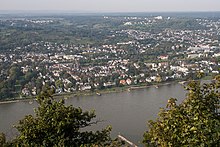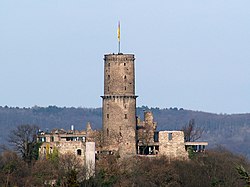|
Bad Godesberg
Bad Godesberg (Kölsch: Bad Jodesbersch) is a borough (Stadtbezirk) of Bonn, southern North Rhine-Westphalia, Germany. From 1949 to 1999, while Bonn was the capital of the Federal Republic of Germany, most foreign embassies were in Bad Godesberg. Some buildings are still used as branch offices or consulates. Geography Bad Godesberg is located along the hills and cliffs of the west bank of the Rhine river, in west central Germany. Godesberg is also the name of the steep hill, of volcanic origin, on the top of which are the ruins of the Godesburg, a castle destroyed in 1583 during the Cologne War. HistoryThe following events occurred, per year:
InfrastructureBonn-Bad Godesberg station is on the Left Rhine line and the line 16 and 63 of the Bonn Stadtbahn. Circa 2018 a new police station was being built on former Haribo property.[4] PoliticsList of twin cities/sister cities Bad Godesberg is twinned with:[5]
Friendly citiesBad Godesberg has friendly relations with:[5]
Culture and AttractionsPublic facilities
Bad Godesberg in LiteratureA whole series of literary works take place in Bad Godesberg. The protagonist of Juli Zeh’s novel “Spieltrieb” (Gaming instinct) are students at the school Päda. Occurring locations in the novel are the school and the villa district. Heinrich Böll’s novel “Frauen vor Flußlandschaft” is set in the villa district between Bonn and Bad Godesberg. On October 30 the documentary piece “Zwei Welten” (“Two worlds”) by Ingrid Müller-Münch had its premiere as a chamber play. The author explains that it shows Bad Godesberg in the change of time. It is a city where the worlds of “rich German people” and Migrants collide. Nine actors perform excerpts from a protocol of mostly young inhabitants of Bad Godesberg, that Müller Münch took record of. In the pre-report of the piece, the Frankfurter Rundschau called it a “Bad-Godesberg-Phänomen” (Bad Godesberg phenomenon). According to Müller-Münch, these two worlds were closer in Bad Godesberg than they were anywhere else. Recurring events
Over the course of each year, there are always many diverse events and festivals that are being organized by the Stadtmarketing Bad Godesberg e.V. (city marketing department of Bad Godesberg). Some of which are flea and antique markets, a French market, a kids’ rally (“Tag der Kleinen Bad Godesberger”/”Day of the small Bad Godesbergers”), a city party, a Christmas Market, and a street food festival. The 23rd German Fire department day took place in Bad Godesberg from June 21 until June 25, 1961. The first CTIF Games took place in Bad Godesberg, since then the International Association of Fire and Rescue Services CTIF organizes the event every four years in different cities. Rhenish traditionsSeveral Carnival clubs have devoted themselves to the upkeep of Rhenish traditions, especially the Godesberger Stadtsoldatenkorps (city soldier corps), the Fidelen Burggrafen (merry burgraves) and the AKP (Allgemeine Karnevals Gesellschaft, General Carnival Society). The Coordination Committee of each Carnival Association is the FAGK (Festausschuss Godesberger Karneval, Festival Committee of Godesberger Carnival). In the carnival season, the clubs also organize a variety of meetings, and on the carnival Sunday a lavish parade. All clubs engage in youth work. EducationSecondary schools
International schools
Notable residents
Trivia
References
External links
Wikimedia Commons has media related to Bad Godesberg. |
||||||||||||||||||||||||||||||||||||||||||||||||||||





